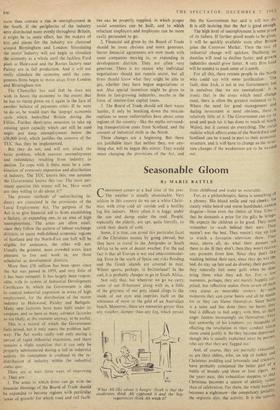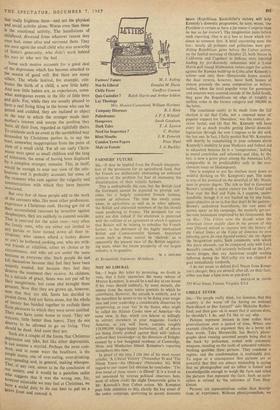Seasonable Gloom
By MARIE BATTLE
C
RRISTMAS comes at a bad time of the year.
The weather is usually abominable. Very seldom in this country do we see a white Christ- mas, with crisp cold air outside and a healthy log fire indoors. More often it is foggy under the sun and damp under the roof. People, especially the elderly, are apt, quite literally, to catch their death of cold.
Some, it is true, can avoid this particular facet of the Christmas nausea by going abroad, but they have to travel to the Antipodes or South Africa to be sure of decent weather. For the sad fact is that all Europe is wet and unaccommodat- ing. Even in the south of Spain one risks flooding and the Greek islands are covered in mist. Winter sports, perhaps, in Switzerland? In the end, it is probably cheaper to go to South Africa.
Not only that, but wherever we go we carry some of our ill-humour along with us, a little of the greyness of our grey island clings to the inside of our eyes and imprints itself on the whiteness of snow or the gold of an Australian beach. Moreover, there are memories greyer than any weather. damper than any fog, which persist
'What Ah like about it hangin' theah is that the moderates think Ah captured it and the Seg- regationists think Ah weah
from childhood and make us miserable.
For, as a philanthropist, Santa is something of a phoney. His bland smile and red checks, his stately white beard 'and warm handshake, cannot disguise—from even the tiniest of Tiny 'rims-- that he demands a price for the gifts he brings. He expects the children to be good. They must remember to wash behind their ears. They mustn't wet the bed. They mustn't stay LIP late to watch a favourite television show. They must, above all, do what their parents tell them to do. If they don't, then they won't receive any presents from him. Since they don't like washing behind their ears, since they do wet the bed, do stay up late and do disobey their parents, they naturally feel some guilt when he does bring them what they ask for. For a few moments, perhaps, they are merely happily sur- prised, but reflection makes them aware of their own status as miserable sinners. At such moments they can curse Santa and all he stands for or they can blame themselves. Since Santa is a saint and has done them no harm, they find it difficult to feel angry with him, so their anger fastens increasingly on themselves. They, feel unworthy of his kindness, yet incapableor effecting the revolution in their conduct which alone could justify it. So they become depressed. though this is usually explained away by parents who say that they are 'fagged out.' And, of course, they are partially exhausted• as are their elders, who, on top of turkey and Christmas pudding and lemonade and crackers, have probably consumed the better part Of a bottle of brandy and three or four cigars. As the years pass, this exhaustion deepens, so that Christmas becomes a season of anxiety rather than of celebration. For them, the whole business becomes a nightmare--the compulsory joviality, the orgiastic diet, the activity. it is the activity
THE SPECTATOR, DECEMBER 7, that really frightens them—and not the physical and social activity alone. Worse even than these is the emotional activity. The humilations of childhood, divorced from whatever reason they once had, come alive and surround them. They are once again the small child who was unworthy of Santa's generosity, who didn't wash behind his ears or who wet the bed.
Some such motive accounts for a good deal of the depression which has become attached to the season of good will. But there are many others. The whole festival, for example, cele- brates the birth of a child, a new little baby. And new little babies are, as experiences, some- what ambiguous events in the life of little boys and girls- For, while they are usually pleased to have a real living thing in the house who can be Petted and cuddled, they are inclined to object to the way in which the stranger steals their mother's interest and usurps the position they have, all their lives, regarded as rightfully theirs. To celebrate such an event in the uninhibited way demanded by Christmas parties is, to say the least, somewhat inappropriate from the point of view of a small child. Yet all our early Christ- mases were spent as small children and the tang of bitterness, the sense of having been displaced by a complete stranger, remains. This, in itself. would be enough to sour our view of the cele- brations and it probably accounts for some of the moaners who rant against the vulgarity and commercialism with which they have become associated.
But very few of these people add to the work of the coroners who, like most other professions, experience a Christmas rush. Having got rid of their accumulated rancours by invective against shopkeepers, they are unlikely to commit suicide. That is reserved for the quiet ones—very often the lonely ones, who are either not invited to any parties or have turned down all their in- vitations; who cannot afford a turkey dinner or can't be bothered cooking one; who are with- out friends or relations, either by choice or by circumstance, and who yet are under the same tensions as everyone else. Such people do not kill themselves because they feel they have been unjustly treated, but because they feel they deserve the treatment they receive. As children, by a miracle of grace, Santa was not put off by their naughtiness, but came and brought them presents. Now that they are grown up, however, now that they are old, Santa has decided to punish them. And not Santa alone, but the whole of society has banded together to exclude them from pleasures to which they were never entitled. Their sins have come home to roost. They are outcasts, little, better than lepers. They do not deserve to be allowed to go on living. They should be dead. And soon they are. Such are a couple of the forms that Christmas depression can take, but like other depressions, n can assume a myriad. Perhaps the most corn- tncm, and in some ways the healthiest, is the simple manic one of over-eating, over-drinking, over-spending and, in general, making whoopee. That, at any rate, seems to be the conclusion of our society, and it would be a pointless sadist w no suggests that it was the wrong one, for, ° .haowever miserable we may feel at Christmas, we ve a social duty to do our best to put on a brave front and conceal it.







































 Previous page
Previous page